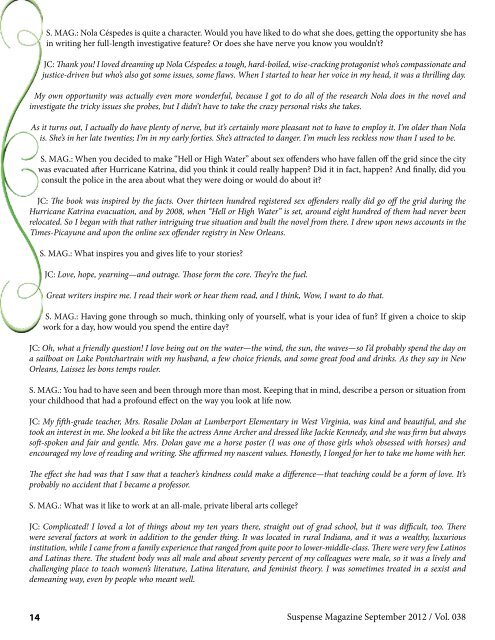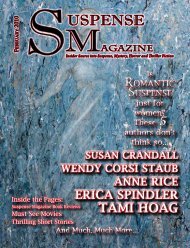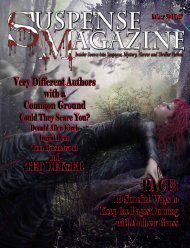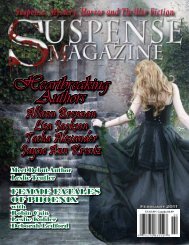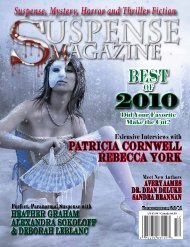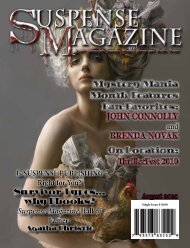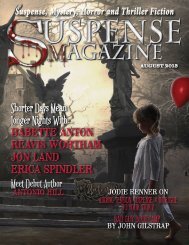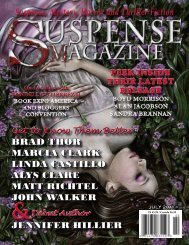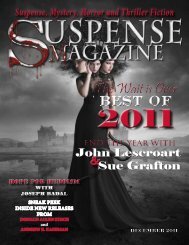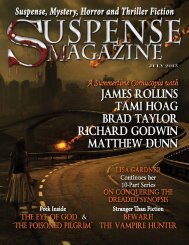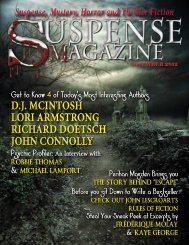Suspense, Mystery, Horror and Thriller Fiction - Suspense Magazine
Suspense, Mystery, Horror and Thriller Fiction - Suspense Magazine
Suspense, Mystery, Horror and Thriller Fiction - Suspense Magazine
Create successful ePaper yourself
Turn your PDF publications into a flip-book with our unique Google optimized e-Paper software.
S. MAG.: Nola Céspedes is quite a character. Would you have liked to do what she does, getting the opportunity she has<br />
in writing her full-length investigative feature? Or does she have nerve you know you wouldn’t?<br />
JC: Thank you! I loved dreaming up Nola Céspedes: a tough, hard-boiled, wise-cracking protagonist who’s compassionate <strong>and</strong><br />
justice-driven but who’s also got some issues, some flaws. When I started to hear her voice in my head, it was a thrilling day.<br />
My own opportunity was actually even more wonderful, because I got to do all of the research Nola does in the novel <strong>and</strong><br />
investigate the tricky issues she probes, but I didn’t have to take the crazy personal risks she takes.<br />
As it turns out, I actually do have plenty of nerve, but it’s certainly more pleasant not to have to employ it. I’m older than Nola<br />
is. She’s in her late twenties; I’m in my early forties. She’s attracted to danger. I’m much less reckless now than I used to be.<br />
S. MAG.: When you decided to make “Hell or High Water” about sex offenders who have fallen off the grid since the city<br />
was evacuated after Hurricane Katrina, did you think it could really happen? Did it in fact, happen? And finally, did you<br />
consult the police in the area about what they were doing or would do about it?<br />
JC: The book was inspired by the facts. Over thirteen hundred registered sex offenders really did go off the grid during the<br />
Hurricane Katrina evacuation, <strong>and</strong> by 2008, when “Hell or High Water” is set, around eight hundred of them had never been<br />
relocated. So I began with that rather intriguing true situation <strong>and</strong> built the novel from there. I drew upon news accounts in the<br />
Times-Picayune <strong>and</strong> upon the online sex offender registry in New Orleans.<br />
S. MAG.: What inspires you <strong>and</strong> gives life to your stories?<br />
JC: Love, hope, yearning—<strong>and</strong> outrage. Those form the core. They’re the fuel.<br />
Great writers inspire me. I read their work or hear them read, <strong>and</strong> I think, Wow, I want to do that.<br />
S. MAG.: Having gone through so much, thinking only of yourself, what is your idea of fun? If given a choice to skip<br />
work for a day, how would you spend the entire day?<br />
JC: Oh, what a friendly question! I love being out on the water—the wind, the sun, the waves—so I’d probably spend the day on<br />
a sailboat on Lake Pontchartrain with my husb<strong>and</strong>, a few choice friends, <strong>and</strong> some great food <strong>and</strong> drinks. As they say in New<br />
Orleans, Laissez les bons temps rouler.<br />
S. MAG.: You had to have seen <strong>and</strong> been through more than most. Keeping that in mind, describe a person or situation from<br />
your childhood that had a profound effect on the way you look at life now.<br />
JC: My fifth-grade teacher, Mrs. Rosalie Dolan at Lumberport Elementary in West Virginia, was kind <strong>and</strong> beautiful, <strong>and</strong> she<br />
took an interest in me. She looked a bit like the actress Anne Archer <strong>and</strong> dressed like Jackie Kennedy, <strong>and</strong> she was firm but always<br />
soft-spoken <strong>and</strong> fair <strong>and</strong> gentle. Mrs. Dolan gave me a horse poster (I was one of those girls who’s obsessed with horses) <strong>and</strong><br />
encouraged my love of reading <strong>and</strong> writing. She affirmed my nascent values. Honestly, I longed for her to take me home with her.<br />
The effect she had was that I saw that a teacher’s kindness could make a difference—that teaching could be a form of love. It’s<br />
probably no accident that I became a professor.<br />
S. MAG.: What was it like to work at an all-male, private liberal arts college?<br />
JC: Complicated! I loved a lot of things about my ten years there, straight out of grad school, but it was difficult, too. There<br />
were several factors at work in addition to the gender thing. It was located in rural Indiana, <strong>and</strong> it was a wealthy, luxurious<br />
institution, while I came from a family experience that ranged from quite poor to lower-middle-class. There were very few Latinos<br />
<strong>and</strong> Latinas there. The student body was all male <strong>and</strong> about seventy percent of my colleagues were male, so it was a lively <strong>and</strong><br />
challenging place to teach women’s literature, Latina literature, <strong>and</strong> feminist theory. I was sometimes treated in a sexist <strong>and</strong><br />
demeaning way, even by people who meant well.<br />
14 <strong>Suspense</strong> <strong>Magazine</strong> September 2012 / Vol. 038


